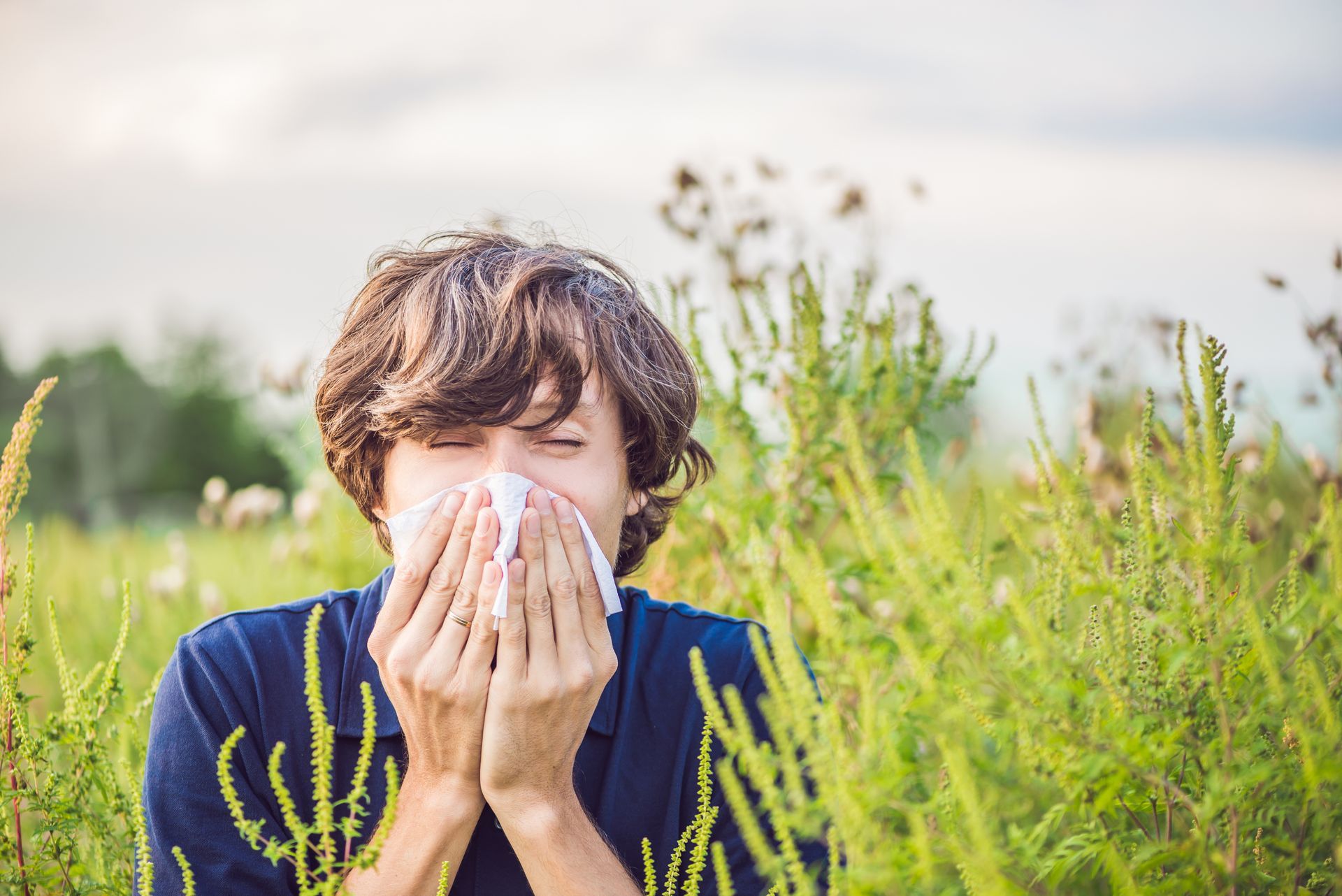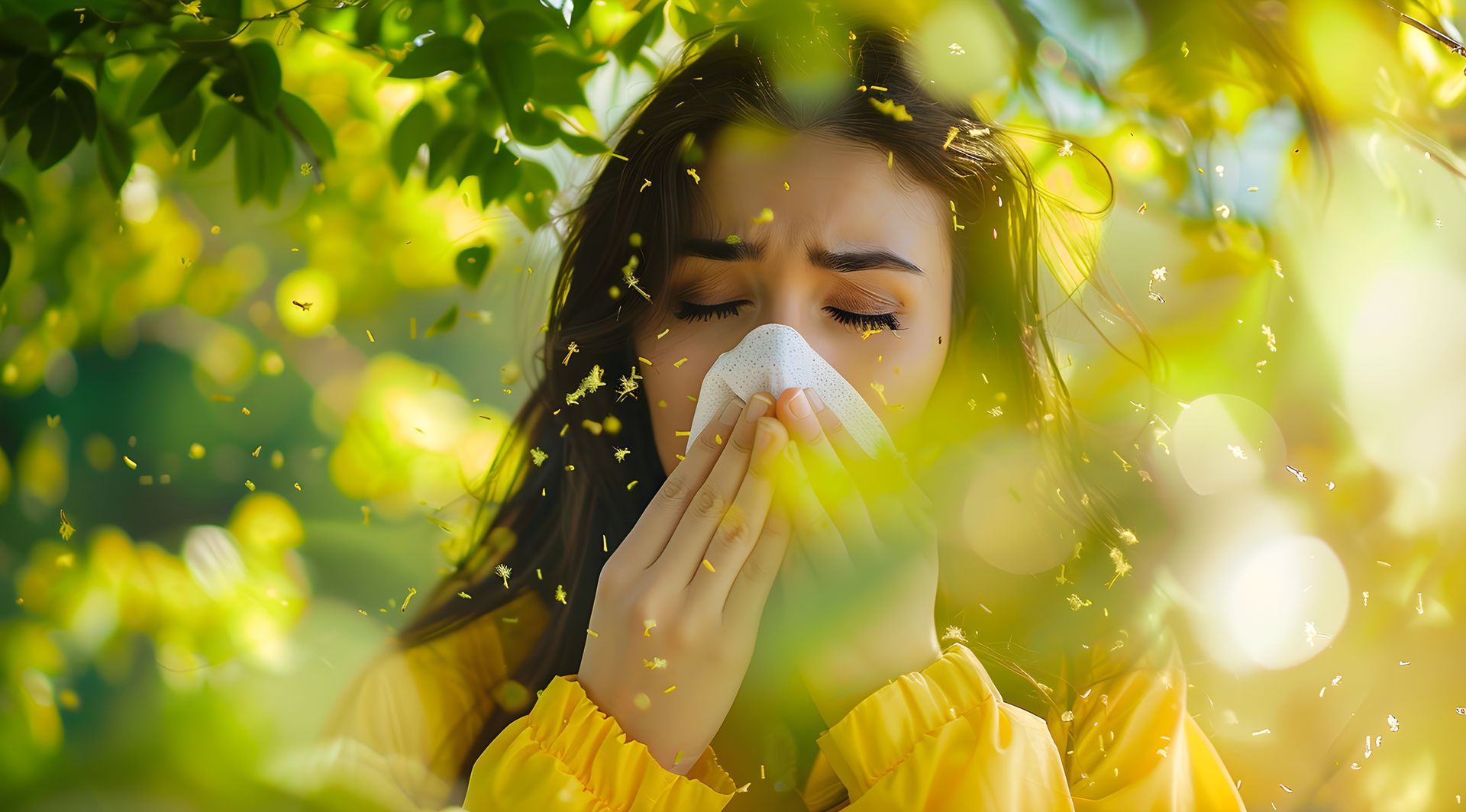San Antonio's Ragweed Season: Must-Know Allergy Prep Tips

Just when you’ve survived the scorching San Antonio summer, Mother Nature throws another curveball—ragweed season.
Ragweed pollen is one of the most notorious
allergies in Texas, and if you're not careful, it can turn a perfect fall day into a tissue-filled nightmare. But don’t worry, we’ve got you covered! We’ll give you the inside scoop on how to prep for those peak allergy days so you can enjoy more of the season with less sneezing.
And if things get too overwhelming, Premier Allergy of Texas is here to help you manage those pesky ragweed allergy symptoms. From practical tips to professional care, we’ll make sure you’re ready to take on this season like a pro.
Stop Sneezing, Start Breathing
Understanding Ragweed Allergies
Ragweed is a stubborn, fast-growing plant that releases pollen grains into the air during the fall, which makes it a significant player in the allergy world, especially in Alamo City. Here's why ragweed is such a troublemaker:
- Prolific pollinator: A single plant can produce up to a billion pollen grains per season.
- Airborne traveler: Ragweed pollen is lightweight and can travel for miles on the wind.
- Allergenic powerhouse: Its pollen contains proteins that many people's immune systems mistakenly identify as threats.
When your immune system reacts to this tiny invader, it goes into overdrive, causing classic pollen allergy symptoms like:
- Sneezing and runny nose
- Itchy or watery eyes
- Congestion and sinus pressure
- Scratchy throat
- Asthma flare-ups
Track Pollen Levels Like a Pro
One of the most powerful tools in your allergy-fighting arsenal is knowledge, specifically, knowing when pollen levels are at their highest.
Keeping tabs on pollen counts can help you:
- Plan outdoor activities for low-pollen days.
- Know when to step up your allergy prevention game.
- Understand why your symptoms might be worse on certain days.
For San Antonio residents, there are several reliable resources to help you stay informed:
- Pollen.com: This website offers a user-friendly allergy forecast for our area.
- Weather Underground: Their website and app provide detailed pollen forecasts.
- KSAT 12 Weather Authority: Our local news station offers pollen counts in their weather reports.
- AccuWeather: Their app includes an "AllergyCast" feature, which gives you a heads-up on pollen levels and even suggests when to take your allergy medication.
Pro tip: Many of these resources also offer mobile apps, so you can check pollen levels on the go.
Practical At-Home Allergy Prep
With a few simple strategies, you can reduce your exposure to ragweed pollen indoors, giving your immune system a much-needed break.
Here are some practical tips to allergy-proof your home:
- Seal the deal:
- Keep windows and doors closed during high pollen days
- Check for and seal any cracks or gaps around windows and doors
- Filter out the bad stuff:
- Use high-efficiency particulate air (HEPA) filters in your air conditioning system
- Change filters regularly
- Clean smart:
- Use a vacuum with a HEPA filter
- Wash bedding in hot water to remove any pollen
- Create a "clean zone":
- Designate an area to remove shoes and outdoor clothing
- Keep pets well-groomed, as they can bring pollen indoors
- Pollen-proof your bedroom:
- Use allergen-proof covers
- Keep windows closed and use a portable air purifier
Over-the-Counter Relief Options
While creating a pollen-free environment is crucial, sometimes you need extra help. That's where over-the-counter (OTC) medications come in handy.
Here's a rundown of common OTC options:
- Antihistamines:
- How they work: Block histamine, the chemical responsible for allergy symptoms
- Best for: Sneezing, runny nose, and itchy eyes
- Nasal Sprays:
- How they work: Reduce inflammation in the nasal passages
- Best for: Congestion and sinus pressure
- Types:
- Corticosteroid sprays: Most effective, but may take a few days to reach full effect
- Decongestant sprays: Provide quick relief but should not be used for more than three days
- Eye Drops:
- How they work: Lubricate eyes and reduce inflammation
- Best for: Itchy, watery eyes
- Decongestants:
- How they work: Shrink swollen nasal passages
- Best for: Stuffy nose and sinus pressure
Remember, while these OTC options can be effective, it's always a good idea to consult a healthcare professional, especially if you have ongoing or severe symptoms.
Ragweed Season FAQ
Ragweed season can bring many questions, especially if it’s one of your triggers. Below, we’ve answered some of the most common inquiries we receive about managing ragweed allergies:
Do Allergy Drops Help with Ragweed Season?
Absolutely! Allergy drops can be highly effective for ragweed allergies. Here's how they help:
- Gradually expose your immune system to small amounts of ragweed allergen
- Over time, your body becomes less reactive to ragweed pollen
- It can reduce the severity of symptoms and the need for other medications
How Long Before Allergy Shots Start Working?
Allergy shots work gradually:
- Initial relief: Some patients notice improvements within 3-6 months
- Significant improvement: Typically seen after 6-12 months of consistent treatment
- Maximum benefit: Usually achieved after 1-3 years of treatment
Everyone's response is unique; your allergist can provide a more personalized timeline.
Are There Any Natural Remedies for Ragweed Allergies?
While medical treatments are often the most effective, some natural remedies can complement your allergy management:
- Nasal irrigation with saline solution to flush out allergens
- Local honey consumption (though scientific evidence is limited)
- Essential oils like peppermint or eucalyptus for congestion (use with caution)
These should not replace prescribed treatments but can be used alongside them under professional guidance.
When Should I Start Treatment for Ragweed Allergies?
Timing is crucial for effective ragweed season management:
- Ideal start time: 2-3 months before ragweed season
- For OTC medications: Begin two weeks before the expected onset of symptoms
- For immunotherapy: Can start any time, but beginning outside peak season is preferable
- Year-round management: Consider those with severe allergies or multiple seasonal triggers
Can Children Get Allergy Shots or Drops for Ragweed?
Yes, Pediatric immunotherapy is available and is generally safe for children over five years old.
- Allergy drops: Preferred for younger children due to ease of administration.
- Allergy shots: Recommended for children seven and up who can tolerate injections
Both forms are considered safe and effective for children when administered under medical supervision.
The Allergy Partner You Never Knew You Needed

You might wonder about the next steps in your allergy management journey. Let Premier Allergy of Texas help you with that.
Picture yourself outdoors, breathing easily, and fully participating in all the activities you love. That's the future we want to help you create. Here's how we can help you:
- Specialized allergy testing: Our specialized allergy testing goes beyond guesswork, pinpointing your exact Texas allergens.
- Tailored treatment options: No one-size-fits-all approaches here. Your treatment plan is as individual as you are.
- Long-term relief strategies: By starting ragweed allergy treatment now, like allergy shots or drops, you can reduce your sensitivity and feel better in the future.
Reach out to Premier Allergy of Texas and take the first step towards a life unhindered by allergies—not just this ragweed season but for many seasons to come.
Time to Show Ragweed Who’s Boss












